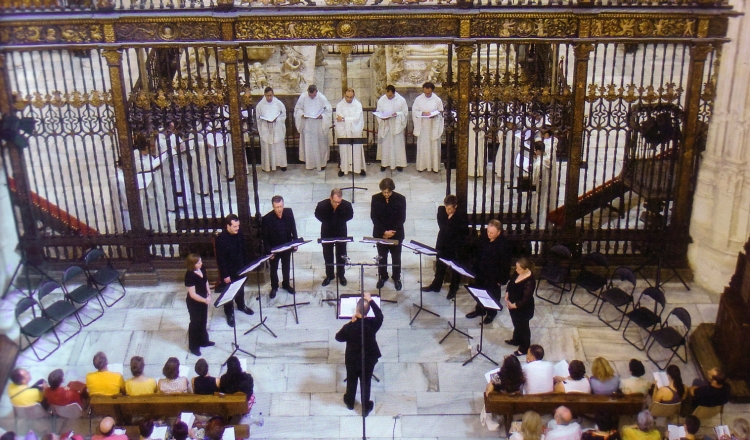
By
Renaissance musical works from a rare 16th-century Burns Library volume of Papal Chapel masses will be brought to life next week, in a special performance directed by Music Department Chair and Professor Michael Noone.
Noone’s internationally acclaimed Ensemble Plus Ultra will present “From Rome to the Heights — Renaissance Musical Treasures from the Papal Chapel” on Nov. 18 in Gasson 100 at 7:00 p.m. The event is free of charge and open only to members of the Boston College community. A reception will follow.
The Ensemble Plus Ultra, hailed by Early Music Today as “a crack squad of the finest British early music singers,” was formed by Noone in 2001. Dedicated to the promotion of historically aware performances of liturgical works from the Renaissance, it is a consort of chamber musicians whose innovative performances display attention to musical and historical detail. The award-winning group works with noted musicologists to call on the latest research and to ensure its unique repertoire.
“It’s a terrific opportunity to bring together first-class musicians with a rare 16th-century volume of music from the Papal Chapel,” Noone said. “It’s exciting for all concerned.”
Noone describes the volume, acquired in 2011, as a rare exemplar of composer Cristóbal de Morales’s “Missarum liber primus (First Book of Mass).” “It is a real treasure and remarkably well preserved; a masterpiece of typography and one of the earliest examples of music printing.”
Part of a collection of 16 polyphonic Masses originally published in 1544 Rome, the book contains Masses for daily use, composed by Morales (ca. 1500-1553) when he was a member of the Papal Chapel. Known in his day as the la luz de España en la música (“the light of Spain in music”), Morales has been a focus of Noone’s research, concerts and recordings.
According to Associate University Librarian for Special Collections and Digital Library Programs Bridget Burke, “the Missarum is a significant addition to the Burns Library’s collection of pre-1700 Catholic liturgical works — currently over 40 volumes ranging from a 14th-century manuscript Franciscan antiphoner to early printed works from Paris, Antwerp, Milan, and Venice.
“Most exciting is that Michael Noone’s ensemble will literally breathe life into this printed object through their performance from the original volume,” she said. “Seeing the work performed gives insights into the basic quality and functionality of the volume: it is large, so that a group could read from it together, to sing.”
This weekend, the ensemble will do a video recording of works from the Burns volume, and in the next few years the group will record a CD of its entire contents. Noone also will work with Burns Library to produce an instructional website based on its rare music holdings — a project, he notes, that will involve BC students.
Because most of the music has never been recorded, he explains, “the best way to introduce this rare volume and its musical treasures to a wider audience is [via] a website video that showcases the library’s musical riches.”
A specially commissioned facsimile will be used at the concert, as the original volume is too valuable to be removed from the library. Its provenance, Burke notes, vividly illustrates the path of early printed works as they are created, collected, dispersed, and incorporated into modern special collections.
Burke thanked Cecilia A. and John F. Farrell for their creation of a Music Library Fund in their name, which allowed for the purchase of the work, and noted that Boston College Libraries have created a digital edition available to scholars around the world, at hdl.handle.net/2345/3146.
Members of the Ensemble Plus Ultra – which last performed at BC in 2011 – will work with students while on campus. Prior to the BC concert, the group debuted under Noone’s direction at the Boston Early Music Festival in both Boston and New York City, and performed in Charlottesville, Va. These concerts featured music from the Burns volume.
The campus event is supported by the Jesuit Institute, the Institute for the Liberal Arts, the Music Department and BC Libraries.



